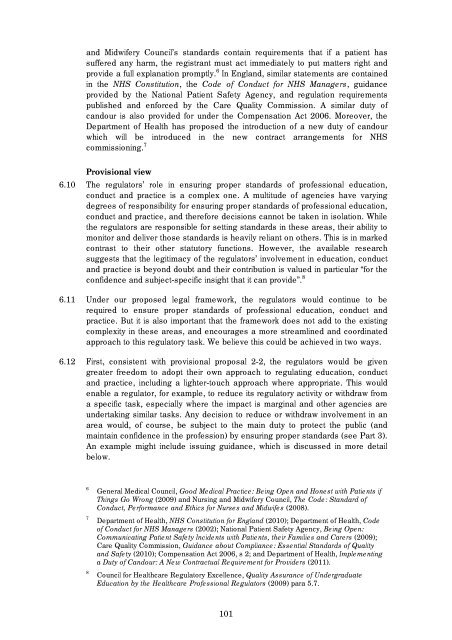Regulation of Health and Social Care Professionals Consultation
Regulation of Health and Social Care Professionals Consultation
Regulation of Health and Social Care Professionals Consultation
Create successful ePaper yourself
Turn your PDF publications into a flip-book with our unique Google optimized e-Paper software.
<strong>and</strong> Midwifery Council’s st<strong>and</strong>ards contain requirements that if a patient has<br />
suffered any harm, the registrant must act immediately to put matters right <strong>and</strong><br />
provide a full explanation promptly. 6 In Engl<strong>and</strong>, similar statements are contained<br />
in the NHS Constitution, the Code <strong>of</strong> Conduct for NHS Managers, guidance<br />
provided by the National Patient Safety Agency, <strong>and</strong> regulation requirements<br />
published <strong>and</strong> enforced by the <strong>Care</strong> Quality Commission. A similar duty <strong>of</strong><br />
c<strong>and</strong>our is also provided for under the Compensation Act 2006. Moreover, the<br />
Department <strong>of</strong> <strong>Health</strong> has proposed the introduction <strong>of</strong> a new duty <strong>of</strong> c<strong>and</strong>our<br />
which will be introduced in the new contract arrangements for NHS<br />
commissioning. 7<br />
Provisional view<br />
6.10 The regulators’ role in ensuring proper st<strong>and</strong>ards <strong>of</strong> pr<strong>of</strong>essional education,<br />
conduct <strong>and</strong> practice is a complex one. A multitude <strong>of</strong> agencies have varying<br />
degrees <strong>of</strong> responsibility for ensuring proper st<strong>and</strong>ards <strong>of</strong> pr<strong>of</strong>essional education,<br />
conduct <strong>and</strong> practice, <strong>and</strong> therefore decisions cannot be taken in isolation. While<br />
the regulators are responsible for setting st<strong>and</strong>ards in these areas, their ability to<br />
monitor <strong>and</strong> deliver those st<strong>and</strong>ards is heavily reliant on others. This is in marked<br />
contrast to their other statutory functions. However, the available research<br />
suggests that the legitimacy <strong>of</strong> the regulators’ involvement in education, conduct<br />
<strong>and</strong> practice is beyond doubt <strong>and</strong> their contribution is valued in particular “for the<br />
confidence <strong>and</strong> subject-specific insight that it can provide”. 8<br />
6.11 Under our proposed legal framework, the regulators would continue to be<br />
required to ensure proper st<strong>and</strong>ards <strong>of</strong> pr<strong>of</strong>essional education, conduct <strong>and</strong><br />
practice. But it is also important that the framework does not add to the existing<br />
complexity in these areas, <strong>and</strong> encourages a more streamlined <strong>and</strong> coordinated<br />
approach to this regulatory task. We believe this could be achieved in two ways.<br />
6.12 First, consistent with provisional proposal 2-2, the regulators would be given<br />
greater freedom to adopt their own approach to regulating education, conduct<br />
<strong>and</strong> practice, including a lighter-touch approach where appropriate. This would<br />
enable a regulator, for example, to reduce its regulatory activity or withdraw from<br />
a specific task, especially where the impact is marginal <strong>and</strong> other agencies are<br />
undertaking similar tasks. Any decision to reduce or withdraw involvement in an<br />
area would, <strong>of</strong> course, be subject to the main duty to protect the public (<strong>and</strong><br />
maintain confidence in the pr<strong>of</strong>ession) by ensuring proper st<strong>and</strong>ards (see Part 3).<br />
An example might include issuing guidance, which is discussed in more detail<br />
below.<br />
6 General Medical Council, Good Medical Practice: Being Open <strong>and</strong> Honest with Patients if<br />
Things Go Wrong (2009) <strong>and</strong> Nursing <strong>and</strong> Midwifery Council, The Code: St<strong>and</strong>ard <strong>of</strong><br />
Conduct, Performance <strong>and</strong> Ethics for Nurses <strong>and</strong> Midwifes (2008).<br />
7 Department <strong>of</strong> <strong>Health</strong>, NHS Constitution for Engl<strong>and</strong> (2010); Department <strong>of</strong> <strong>Health</strong>, Code<br />
<strong>of</strong> Conduct for NHS Managers (2002); National Patient Safety Agency, Being Open:<br />
Communicating Patient Safety Incidents with Patients, their Families <strong>and</strong> <strong>Care</strong>rs (2009);<br />
<strong>Care</strong> Quality Commission, Guidance about Compliance: Essential St<strong>and</strong>ards <strong>of</strong> Quality<br />
<strong>and</strong> Safety (2010); Compensation Act 2006, s 2; <strong>and</strong> Department <strong>of</strong> <strong>Health</strong>, Implementing<br />
a Duty <strong>of</strong> C<strong>and</strong>our: A New Contractual Requirement for Providers (2011).<br />
8 Council for <strong>Health</strong>care Regulatory Excellence, Quality Assurance <strong>of</strong> Undergraduate<br />
Education by the <strong>Health</strong>care Pr<strong>of</strong>essional Regulators (2009) para 5.7.<br />
101
















